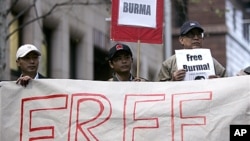Australia says it will ease sanctions on Burma because of “positive steps” that have been taken towards democracy. Canberra has suggested that more restrictions could be lifted, if such progress continues. Campaigners say they are disappointed at Australia’s actions because of allegations of increases in serious human rights abuses by Burmese military authorities.
Australia says it will reduce sanctions on Burma because of steps authorities there have taken towards establishing a more open democracy.
Australian Foreign Minister Kevin Rudd noted “positive developments” in Burma, including the increased participation of opposition parties in elections, the release of more than 200 political prisoners, and the legalizing of trade unions.
Canberra has imposed an arms embargo on Burma and financial sanctions and travel restrictions on certain Burmese officials. These remain in place.
But Rudd said Monday that some restrictions will be eased. Members of Burma's new government who were not previously on Canberra’s watch list will not face restrictions. Former Burmese government ministers and tourism officials will also no longer be subject to travel and financial sanctions.
Democracy activists here say they are disappointed with Canberra’s decision.
“We do not think that enough has changed in Burma to warrant any easing of sanctions and this is particularly true in light of the continuing detention of over 1,500 political prisoners, the increase in serious human rights violations in Burma over the last 12 months, and the on-going military attacks targeting civilians,” Zetty Brake said. Brake is a coordinator for Burma Campaign Australia.
Activists insist that Canberra is out of step with the United States and Europe, which made strict demands before considering any easing of their sanctions.
In response, the Australian government says it is in talks with Burmese pro-democracy leader Aung San Suu Kyi.
Canberra is urging the Burmese authorities to release all political prisoners and ensure elections are free and fair.
Australia to Reduce Burma Sanctions




